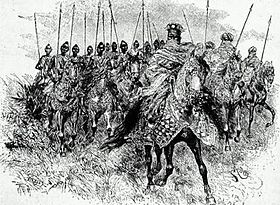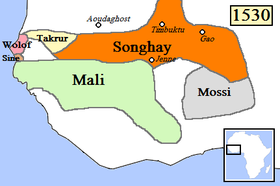- Mossi Kingdoms
-
History of Burkina Faso 
This article is part of a seriesBura culture Mossi people and Mossi Kingdoms French Upper Volta Republic of Upper Volta Agacher Strip War Contemporary Burkina 2011 Burkinabè protests
Burkina Faso Portal
The Mossi Kingdoms, sometimes mistakenly referred to as the Mossi Empire, were a trio of powerful states in modern-day Burkina Faso. Each state possessed similar customs and government, but were ruled independently of each other. At times, the kingdoms fought amongst themselves or united in the face of Muslim aggression from the north in Mali.
Contents
Origins
 The cavalry of the Mossi states were experts at raiding deep into enemy territory, even against the formiddable Mali Empire.
The cavalry of the Mossi states were experts at raiding deep into enemy territory, even against the formiddable Mali Empire.
The Mossi immigrated into Burkina Faso from northern Ghana around the turn of the 11th century. They displaced the original inhabitants known as the Yonyonse, and began forming complex states with strong militaries focused on the use of cavalry. The Mossi successfully defended their new home from Mandinka and Songhai Muslims and even captured territory in Mali at times. They followed and still follow traditional African faiths.
Tengkodogo
The first Mossi kingdom was Tengkodogo, also known as Tenkodogo (The old motherland)[1]. It was formed in 1120 in present-day Tenkodogo of Burkina Faso. The ruler of the kingdom was called the Naabaa and his capital was also called Tengkodogo (from which the kingdom gets its name).
Yatenga
The second Mossi kingdom was Yatenga. It was formed in 1333 during the height of the aggressive Mali Empire to the north. Its ruler was called Yatenga Naaba or Rima and ruled from the capital city of Waiguya (founded by Naaba Yadegaa and meaning "Come and worship the king" (French)[1]) (modern-day Ouahigouya in Burkina Faso).
Wogodogo
The third and last of the great Mossi kingdoms was Wogodogo, founded by the son of Princess Yennenga Naaba Ouedraogo [2]. Wogodogo became the premier Mossi state in Burkina Faso forming in 1441. Its leader, the Moogo Naaba ruled from present-day Ouagadougou (named for the kingdom).
Downfall
The Mossi kingdoms all survived until the late 19th century with the invasion of Mossi, by the French. The Tengkodogo kingdom, first of the Mossi states, was ironically the first to be conquered by the French in 1894. The Yatenga kingdom, not desiring the same fate as Tengkodogo, signed a protectorate agreement with the French in May of 1895. Wagadougou was conquered and placed under protectorate status in September of the same year.[citation needed] Wobogoo, the last independent Mogho Naba of Mossi and ruler of Ouagadougou was formally deposed in 1897 and forced into exile in Zongoiri in the Gold Coast, where he died in 1904.[3]
See also
- Rulers of the Mossi state of Tenkodogo
- Rulers of the Mossi state of Yatenga
- Rulers of the Mossi state of Wogodogo
Sources
- ^ a b http://www.culture.gov.bf/textes/tourisme_histoire.htm
- ^ http://www.burkina-faso.ca/la-princesse-yennenga-la-formation-et-la-naissance-de-lempire-mossi/
- ^ Lipschutz, Mark R.; Rasmussen, R. Kent (1989). Dictionary of African historical biography. University of California Press. p. 249. ISBN 0-520-06611-1. http://books.google.ca/books?id=QYoPkk04Yp4C&pg=PA249.
 Burkina Faso topics
Burkina Faso topicsHistory Geography Politics President · Prime Minister · Government · Political parties · Elections · Constitution · Foreign relations · Military · Law enforcement · Human rights (LGBT rights)Economy Agriculture · Energy · Tourism · West African CFA franc · Communications · Companies · Mining · Transport · Trade unions · HealthDemographics Culture Sahelian kingdoms Categories:- Sahelian kingdoms
- History of Burkina Faso
- States of Medieval Africa
- 12th century in Africa
Wikimedia Foundation. 2010.

